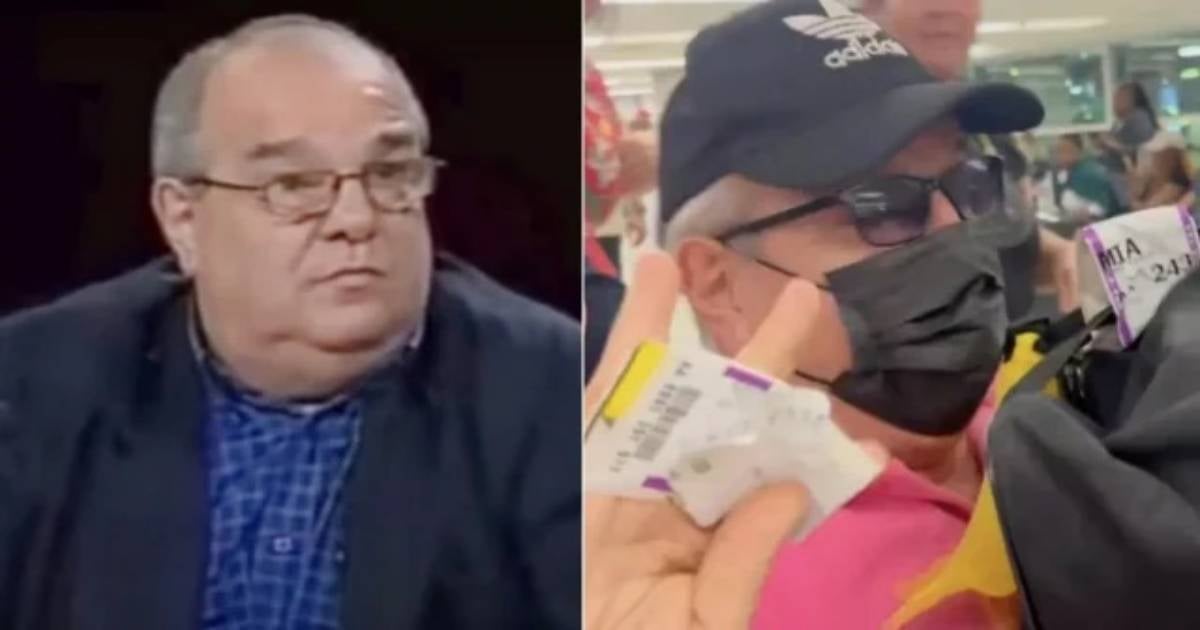Manuel Menéndez Castellanos, former secretary of the Communist Party in the province of Cienfuegos and a former member of Fidel Castro's "coordination and support team," denied in a U.S. visa interview that he had belonged to the Communist Party. However, he admitted it in a written application, minimizing the significance of this fact.
Based on this evidence, Cuban-American congressmen Mario Díaz-Balart, Carlos A. Giménez, and María Elvira Salazar, along with House Judiciary Committee Chairman Jim Jordan and Immigration Integrity, Security, and Enforcement Subcommittee Chairman Tom McClintock, sent a letter to Secretary of State Anthony Blinken. The signatories are urging federal government intervention and the provision of evidence in this case, which has captured the attention of the Cuban community in the U.S. due to the entry of a regime enforcer with all the benefits that U.S. residency provides, as noted in the letter shared on social media by Martí Noticias journalist Mario J. Pentón.
Controversy Over Menéndez Castellanos' U.S. Entry
The letter references the Immigration and Nationality Act (INA), which states that an immigrant is inadmissible if "he is or has been a member of or affiliated with the Communist Party or any other totalitarian party, national or foreign." Hence, they seek an explanation for Menéndez Castellanos' entry into the U.S.
The legislators note that "according to records obtained by the Committee, in his immigrant visa application and when questioned by immigration officials, Menéndez Castellanos denied any affiliation." However, "in a subsequent immigration application, Menéndez Castellanos admitted to having been a member of the Communist Party of Cuba but downplayed that fact."
They add that "incredibly, according to records from the Biden-Harris Administration obtained by the Committee, advanced background checks on Menéndez Castellanos did not find any information that would make him inadmissible under the INA."
The former Communist Party first secretary in Cienfuegos arrived at Miami International Airport on the afternoon of Thursday, August 15. Attempting to go unnoticed, he wore a cap, face mask, and glasses, arrived in a wheelchair, and carried a black briefcase on his lap. He was confronted by journalist Mario J. Pentón upon arrival.
Immediately, the exile Cuban community was shocked and outraged by the news of his arrival. In their letter, the congressmen expressed their dissatisfaction with the procedure followed by the Biden-Harris administration regarding this case. They pointed out that "if only a simple five-minute internet search had been conducted, the disturbing ties of Menéndez Castellanos to the Castro regime would have been discovered."
Under the auspices of the U.S. House Judiciary Committee, they demanded historical information on the case, including but not limited to, the foreigner's immigration history, immigration benefit applications, the immigration or consular file (including all consular notes), and the immigration detention status and history. They also requested information on the time, date, and place of all entries of the foreigner into the United States.
Lastly, they sought an explanation of the verification failures that led to the lack of awareness by the Administration of Menéndez Castellanos' affiliation with the Castro regime.
When questioned about this case, a State Department spokesperson responded, "Visa records are confidential under U.S. law. We do not discuss individual visa cases. All travelers to the United States are subject to an appropriate interagency security screening based on nationality and the purpose of their travel," in a brief statement addressing the allegations of Menéndez Castellanos' ties to the Cuban government.
The Foundation for Human Rights in Cuba (FHRC) has identified a thousand Cuban enforcers, 117 of whom have reportedly entered the United States in the past year (since February 2023), "many of them lying," according to Tony Costa, director of the NGO, as reported by Martí Noticias.
With these numbers in hand, the foundation, dedicated to identifying individuals who have violated human rights in Cuba, estimates that the number of enforcers from the Island entering the U.S. has multiplied fivefold, as they had documented about twenty, and now the number stands at 117. This has been possible, they emphasize, within the context of an unprecedented migration wave.
Key Questions About Menéndez Castellanos' Entry into the U.S.
Given the significant controversy surrounding the entry of Manuel Menéndez Castellanos into the United States, several questions have arisen. Here, we address some of the key concerns.
Why is Menéndez Castellanos' entry into the U.S. controversial?
Menéndez Castellanos' entry is controversial because he denied his affiliation with the Communist Party in a visa interview but admitted it in a written application. This discrepancy, along with his history as a regime enforcer, has raised concerns among Cuban-American leaders and the exile community.
What actions are being taken by U.S. lawmakers?
U.S. lawmakers, including Cuban-American congressmen and committee chairmen, have sent a letter to Secretary of State Anthony Blinken, urging federal intervention and the provision of evidence related to Menéndez Castellanos' entry. They are demanding historical information and an explanation for the verification failures that allowed him to enter.
How has the Cuban exile community reacted?
The Cuban exile community has expressed shock and outrage over Menéndez Castellanos' entry. They are particularly concerned about the entry of a known regime enforcer with all the benefits of U.S. residency, which they see as a failure of the current administration's immigration policies.
What is the Foundation for Human Rights in Cuba's stance?
The Foundation for Human Rights in Cuba has identified a significant number of Cuban enforcers who have entered the U.S. by lying about their background. They estimate that the number has increased fivefold in the past year, highlighting the need for stricter immigration regulations and enforcement.
